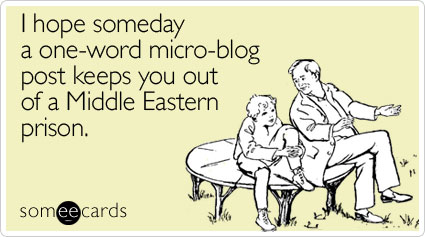 I’ve been working in digital marketing since 1997, and each year I believe more strongly in the power of relationships for effectively connecting brands with consumers. Back then, I never could have imagined the incredible connection-building possibilities provided by social media, but I am enjoying witnessing the world-wide adoption of social media as a viable business tool! There’s no place I’d rather be than in the middle of this shift, and am pleased to have the opportunity to share my expertise with and learn from the team at Collective Bias as their Chief Social Marketing Officer. This is very exciting and something John Andrews, the founder of Collective Bias, and I have talked about for a long time.
I’ve been working in digital marketing since 1997, and each year I believe more strongly in the power of relationships for effectively connecting brands with consumers. Back then, I never could have imagined the incredible connection-building possibilities provided by social media, but I am enjoying witnessing the world-wide adoption of social media as a viable business tool! There’s no place I’d rather be than in the middle of this shift, and am pleased to have the opportunity to share my expertise with and learn from the team at Collective Bias as their Chief Social Marketing Officer. This is very exciting and something John Andrews, the founder of Collective Bias, and I have talked about for a long time.
I love the blogging community because when it comes down to it, they genuinely want to share useful information, and to connect people to information and products. That really hit home for me when I was CMO of e.l.f. Cosmetics (Eyes Lips Face) from 2008-2010. I pioneered a program to develop and utilize blogger relationships to exponentially increase and sustain the e.l.f. brand visibility, and because of the blogger energy, talent, and networks, the program at e.l.f. brand evolved and succeeded with a unique approach toward not just beauty, but also accessibility, interactivity and consumer engagement. At that time, the jury was still out on the business value of social media, but the success of this program confirmed for e.l.f. (and other previously skeptical businesses), that building relationships with consumers not only enhances the long-term viability of the brand, but has a direct short-term effect on the bottom line.
Read more

 Every business needs content in order to be found in search, and to differentiate them from the competition. Without quality, helpful content (and lots of it), you’re lost in a school of fish that are all the same color. Who’s going to find you? Who’s going to pick you?
Every business needs content in order to be found in search, and to differentiate them from the competition. Without quality, helpful content (and lots of it), you’re lost in a school of fish that are all the same color. Who’s going to find you? Who’s going to pick you? Bloggers are amazing people who add a great deal of value to my life and work – and in my social media saturated work/life, that means a great deal!
Bloggers are amazing people who add a great deal of value to my life and work – and in my social media saturated work/life, that means a great deal!  I’ve been working in digital marketing since 1997, and each year I believe more strongly in the power of relationships for effectively connecting brands with consumers. Back then, I never could have imagined the incredible connection-building possibilities provided by social media, but I am enjoying witnessing the world-wide adoption of social media as a viable business tool! There’s no place I’d rather be than in the middle of this shift, and am pleased to have the opportunity to share my expertise with and learn from the team at
I’ve been working in digital marketing since 1997, and each year I believe more strongly in the power of relationships for effectively connecting brands with consumers. Back then, I never could have imagined the incredible connection-building possibilities provided by social media, but I am enjoying witnessing the world-wide adoption of social media as a viable business tool! There’s no place I’d rather be than in the middle of this shift, and am pleased to have the opportunity to share my expertise with and learn from the team at 
 Today I was part of a great Twitter chat #SOBcon. Lots of smart folks and a question came up that I found intriguing because of the dialogue it stirred in everyone.
Today I was part of a great Twitter chat #SOBcon. Lots of smart folks and a question came up that I found intriguing because of the dialogue it stirred in everyone.